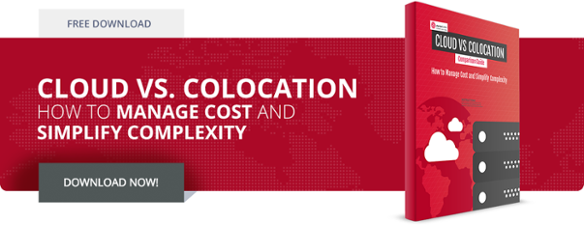Colocation Pricing Comparison: Understanding Your Options

For a comprehensive colocation pricing comparison, you need to arm yourself with some knowledge.
Server Colocation can be the right way for organizations to achieve cost savings, simpler management, and flexibility for mission-critical IT workloads. Gartner research predicts that worldwide spending on Colocation services will reach $74.5 billion by 2020.
Moving your servers off-site to a trusted vendor’s facility can allow your organization to maintain control over your data, while achieving cost savings and other benefits of a colocated IT infrastructure.
Server Colocation pricing can vary significantly, depending on a large number of factors which we've outlined below.
The Colocation Pricing Comparison You Need: 10 Factors to Consider
In the Washington, D.C. area, Colocation costs can start at $100 a month for a single server with 100 Mbps of Internet bandwidth, and increase to as low as $600 per month for a full cabinet.
Confused about where Colocation fits into the spectrum of modern hosting options? For more insight, we recommend Cloud vs. Colocation vs. Hybrid Cloud: Which is Best for Business?
If you believe that Server Colocation is the best choice for your business, you may have begun the process of researching provider and pricing options. If you are new to Colocation cost research, this process can be confusing. It’s difficult to provide a single estimate for the cost of Colocation, since there are a large number of variables which can impact the price paid.
If you’re wondering how to understand your options, you’re in the right place. In this post, you’ll gain insight into the variables which should impact Colocation pricing, and some knowledge about how to select a high-value hosting provider.
For more insight, we recommend How Much Does Server Colocation Cost?
1. Rack Capacity
One of the simplest factors used to calculate the price your organization pays each month for Colocation services is rack and/or cabinet capacity. This is a measurement of the square feet your servers occupy in the data center’s racks and cabinets. The vast majority of Colocation providers use rack capacity as a pricing factor.
When interviewing providers, verifying rack and cabinet capacity is important. No business wants to find out on move-in day that their server dimensions are incompatible with the provided racks and cabinets. Keep in mind that the width and depth of your servers must be accommodated for. We've had customers bring in equipment into the data center that was too wide or too deep for standard racks/cabinets. This delayed installation as customization was required to meet the needs of the customer.
2. Hardware and Maintenance
The care of data can be costly, including the necessary upkeep of hardware for power, cooling, and telecommunications. Your Colocation pricing will include costs to cover the use of the data center’s hardware, infrastructure, and maintenance to equipment.
Generally, hardware and maintenance fees will be billed at a flat, monthly rate. The costs of hardware and upkeep should be easy to understand, and clearly spelled out in a pricing agreement your organization receives from a prospective Colocation vendor.
This is one of the main advantages of colo in that power/cooling/telecom service costs are spread out amongst data center tenants, mitigating the cost if a customer was funding all of those requirements on their own.
3. Connectivity
Generally, most data centers offer high-speed Internet connectivity to Colocation clients. This may be included in the pricing, or it may be considered an add-on service. If your organization requires high-speed connectivity for mission-critical workloads, this could result in a higher price paid each month for connectivity.
Depending on the type of connectivity offered by your provider, you may want to explore whether your organization is allowed to “bring your own IP connection” by using another Internet service provider. At Atlantech Online, we offer a blended IP circuit that utilizes the connections we have to the Internet. This helps mitigate cost. Typically, bandwidth in a data center is going to be less expensive than at a customer site as the local loop costs aren't required or are already backed into the pricing for the colo.
4. Bandwidth
Maintaining access to your server in the off-site data center will require bandwidth. Depending on how your organization is using your servers, these bandwidth needs could be significant. Bandwidth requirements are typically calculated into monthly Colocation fees. A high-quality Colocation provider will work with prospective clients to understand and accommodate bandwidth requirements prior to the move-in date. At Atlantech Online, we typically provide 100 Mbps Internet bandwidth service with the cost of colo.
5. Power
Switching to Colocation allows your organization to share the monthly power costs of a hosting provider’s data center, which are often significant. These power costs are calculated into your monthly Colocation bill. However, with a high-quality Colocation provider, there’s often another power charge which is related to redundancy and risk management.
If there’s an electricity outage, the right Colocation provider has several backup plans in place to ensure your organization can maintain access to your data assets. Atlantech Online’s data centers in Rockville and Silver Spring, Maryland each have online generators and in Silver Spring, the data center has a direct connection to a multi-substation power grid.
Power requirements need to be accommodated as the more power used, the more heat generated. If you're in a locked cabinet, generating too much heat can damage servers. Though having high density is desirable as it costs less when using less rack capacity (see #1 above), it is counterproductive to stack equipment such that the heat generated cannot be dissipated.
6. Security and Compliance
With the right vendor partnership, your organization can achieve greater information security and fewer risks with a switch to Colocation. While no provider includes an itemized monthly charge for “security,” physical security and compliance are two things to keep in mind when evaluating pricing and comparing options.
If your organization is subject to regulatory requirements, finding a Colocation provider who can comply with HIPAA, SOX, or other measures is crucial. Ensure prospective data centers have up-to-date audits on-hand to demonstrate compliance.
Finally, ensure you’re paying for physical security in a prospective data center by evaluating the facility and procedures during your tour and vendor interviews:
- Up-to-date data center security procedures
- Facilities access management processes
- 24/7 staffing
- Key cards or biometric access technology
7. Backups
A switch to Colocation can simplify the task of data backups. If you’re planning on outsourcing backups to your vendor, ensure you’re paying for risk reduction in exchange for this aspect of your monthly Colocation costs. Ideally, your backups should include a customer interface for immediate access to backup and recovery, and remote data storage in case of a natural disaster.
8. Data Center Location
Another variable which can have a moderate impact on the cost of Colocation Services is related to geography and real estate. A business in the greater Washington, D.C. metro area will likely pay more for Colocation services than a business in North Dakota, which is a simple factor of more expensive real estate costs. We see our data centers as convenience data centers. If your business is in the I-270 corridor, Montgomery County or inside the Washington DC city limits, both facilities are easy to access. The Silver Spring data center is on the Red Line of Metro. Rather than taking up office space with servers and associated infrastructure, for many customers, it makes sense to have servers nearby in a purpose-built facility that mitigates costs.
9. Support
Both the volume and quality of support offered by Colocation providers can vary significantly. To ensure your organization has a positive experience after move-in day, it’s important to be clear with prospective vendors about your needs and understand how price quotes translate to services offered.
Before you select a Colocation provider, evaluate whether the pricing includes 24/7, live, expert support. Is the data center fully-staffed 24/7? If your organization has a question, will you reach a local representative for one-call resolution in the middle of the night? Some hosting providers may offer support as an add-on service. It’s important to not only fully explore support offerings, but evaluate online reviews to ensure prospective hosting and Colocation providers offer exceptional customer support.
10. Flexibility
Before you sign a Colocation agreement, be sure you understand whether you’re signing a lock-in contract. Does your organization have the flexibility to scale your services with the provider during the lifetime of your contract? What if your bandwidth needs change significantly?
Knowing the flexibility of your vendor to customize and scale their services is important, especially for organizations with plans to grow and scale their technology. Many small businesses discover a need to expand their Colocation investment after move-in day.
Understanding Your Colocation Options
It’s important to keep in mind that cost doesn’t always translate to value. Before you select a Colocation provider on cost alone, it’s important to ensure that a prospective provider offers security, redundancy, and exceptional service in exchange for the price paid each month.
For more information on Colocation pricing comparisons and to customize a price quote, click here to explore Atlantech Online’s pricing options. Mention offer code SC52 to receive your first month of Colocation services free! 

